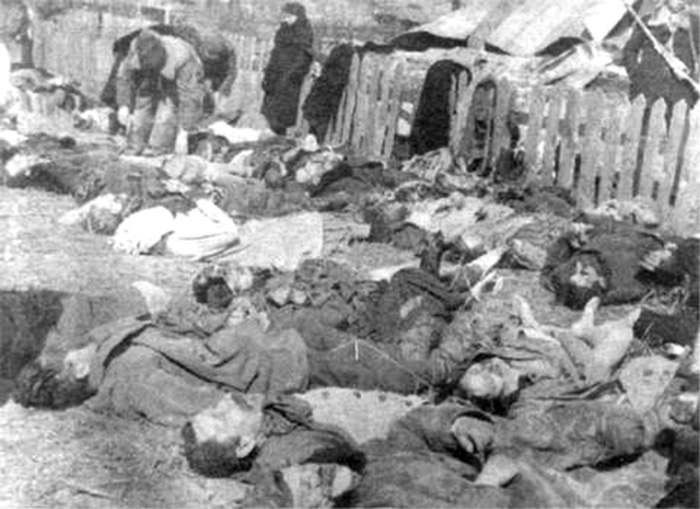|
Kresowa Księga Sprawiedliwych
The Book of the Righteous of the Eastern Borderlands ( pl, Kresowa księga sprawiedliwych), edition of Institute of National Remembrance (Poland), gathering testimonies of humanity of Ukrainians during the Ukrainian-Polish ethnic conflict and Massacres of Poles in Volhynia The massacres of Poles in Volhynia and Eastern Galicia ( pl, rzeź wołyńska, lit=Volhynian slaughter; uk, Волинська трагедія, lit=Volyn tragedy, translit=Volynska trahediia), were carried out in German-occupied Poland by the ..., covering the period of 1939–1945 yr. The book refers to 882 cases of aid provided by 1341 persons allowing for 2527 lives to be saved. The identities of 896 rescuers have been established. Also are included reports of 384 cases of rescuers who were murdered in punitive aftermath. External links Niedzielko Romuald, ''THE BOOK OF THE RIGHTEOUS OF THE EASTERN BORDERLANDS 1939 - 1945 (pdf)'', Instytut Pamięci Narodowej Massacres of Poles in Volhynia Institut ... [...More Info...] [...Related Items...] OR: [Wikipedia] [Google] [Baidu] |
Institute Of National Remembrance
The Institute of National Remembrance – Commission for the Prosecution of Crimes against the Polish Nation ( pl, Instytut Pamięci Narodowej – Komisja Ścigania Zbrodni przeciwko Narodowi Polskiemu, abbreviated IPN) is a Polish state research institute in charge of education and archives with investigative and lustration powers. The IPN was established by the Polish parliament by the Act on the Institute of National Remembrance of 18 December 1998, which incorporated the earlier Main Commission for the Prosecution of Crimes against the Polish Nation of 1991. IPN itself had replaced a body on Nazi crimes established in 1945. In 2018, IPN's mission statement was amended by the controversial Amendment to the Act on the Institute of National Remembrance to include "protecting the reputation of the Republic of Poland and the Polish Nation". The IPN investigates Nazi and Communist crimes committed between 1917 and 1990, documents its findings, and disseminates them to the public ... [...More Info...] [...Related Items...] OR: [Wikipedia] [Google] [Baidu] |
Poland
Poland, officially the Republic of Poland, is a country in Central Europe. It is divided into 16 administrative provinces called voivodeships, covering an area of . Poland has a population of over 38 million and is the fifth-most populous member state of the European Union. Warsaw is the nation's capital and largest metropolis. Other major cities include Kraków, Wrocław, Łódź, Poznań, Gdańsk, and Szczecin. Poland has a temperate transitional climate and its territory traverses the Central European Plain, extending from Baltic Sea in the north to Sudeten and Carpathian Mountains in the south. The longest Polish river is the Vistula, and Poland's highest point is Mount Rysy, situated in the Tatra mountain range of the Carpathians. The country is bordered by Lithuania and Russia to the northeast, Belarus and Ukraine to the east, Slovakia and the Czech Republic to the south, and Germany to the west. It also shares maritime boundaries with Denmark and Sweden. ... [...More Info...] [...Related Items...] OR: [Wikipedia] [Google] [Baidu] |
Ukrainians
Ukrainians ( uk, Українці, Ukraintsi, ) are an East Slavs, East Slavic ethnic group native to Ukraine. They are the seventh-largest nation in Europe. The native language of the Ukrainians is Ukrainian language, Ukrainian. The majority of Ukrainians are Eastern Orthodox Church, Eastern Orthodox Christians. While under the Polish–Lithuanian Commonwealth, the Austrian Empire, and then Austria-Hungary, the East Slavic population who lived in the territories of modern-day Ukraine were historically known as Ruthenians, referring to the territory of Ruthenia, and to distinguish them with the Ukrainians living under the Russian Empire, who were known as Little Russians, named after the territory of Little Russia. Cossacks#Ukrainian Cossacks, Cossack heritage is especially emphasized, for example in the Shche ne vmerla Ukraina, Ukrainian national anthem. Ethnonym The ethnonym ''Ukrainians'' came into wide use only in the 20th century after the territory of Ukraine obtained ... [...More Info...] [...Related Items...] OR: [Wikipedia] [Google] [Baidu] |
Massacres Of Poles In Volhynia
The massacres of Poles in Volhynia and Eastern Galicia ( pl, rzeź wołyńska, lit=Volhynian slaughter; uk, Волинська трагедія, lit=Volyn tragedy, translit=Volynska trahediia), were carried out in German-occupied Poland by the Ukrainian Insurgent Army, or the UPA, with the support of parts of the local Ukrainian population against the Polish minority in Volhynia, Eastern Galicia, parts of Polesia and Lublin region from 1943 to 1945. The peak of the massacres took place in July and August 1943. Most of the victims were women and children. Many of the Polish victims regardless of age or gender were tortured before being killed; some of the methods included rape, dismemberment or immolation, among others. The UPA's actions resulted in between 50,000 and 100,000 deaths. According to Timothy Snyder, the ethnic cleansing was a Ukrainian attempt to prevent the post-war Polish state from asserting its sovereignty over Ukrainian-majority areas that had been part of th ... [...More Info...] [...Related Items...] OR: [Wikipedia] [Google] [Baidu] |
History Books About Poland In World War II
History (derived ) is the systematic study and the documentation of the human activity. The time period of event before the invention of writing systems is considered prehistory. "History" is an umbrella term comprising past events as well as the memory, discovery, collection, organization, presentation, and interpretation of these events. Historians seek knowledge of the past using historical sources such as written documents, oral accounts, art and material artifacts, and ecological markers. History is not complete and still has debatable mysteries. History is also an academic discipline which uses narrative to describe, examine, question, and analyze past events, and investigate their patterns of cause and effect. Historians often debate which narrative best explains an event, as well as the significance of different causes and effects. Historians also debate the nature of history as an end in itself, as well as its usefulness to give perspective on the problems o ... [...More Info...] [...Related Items...] OR: [Wikipedia] [Google] [Baidu] |


.jpg)